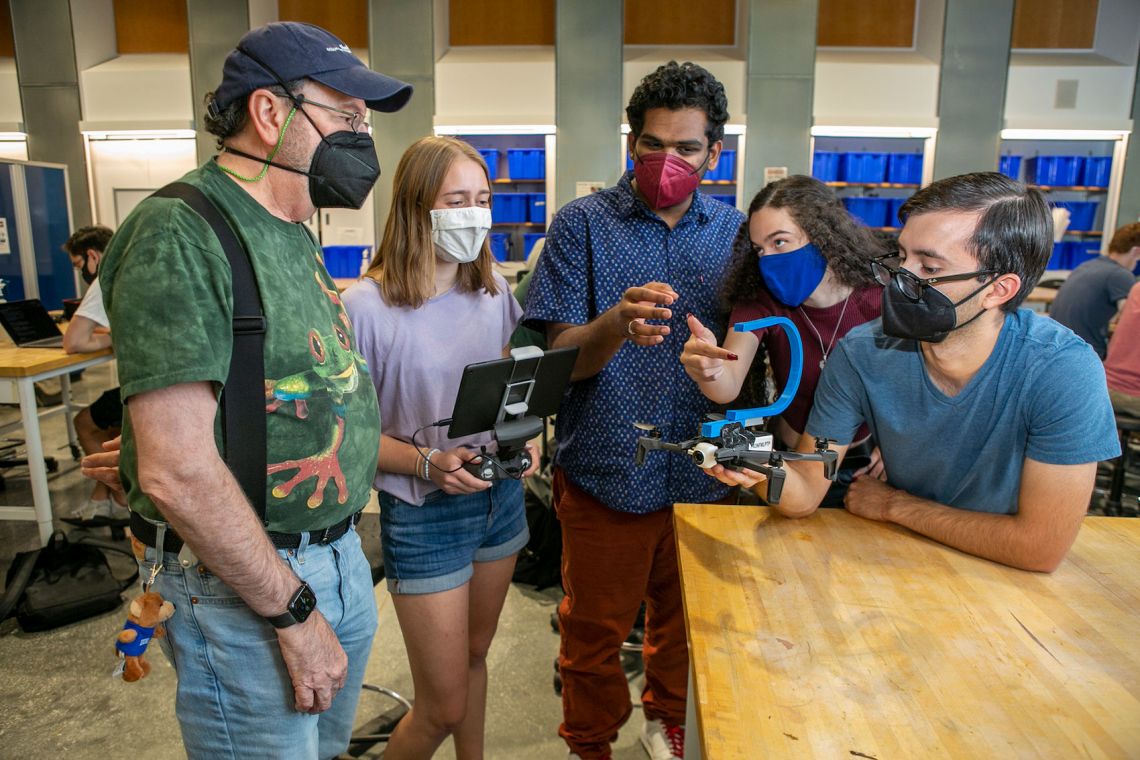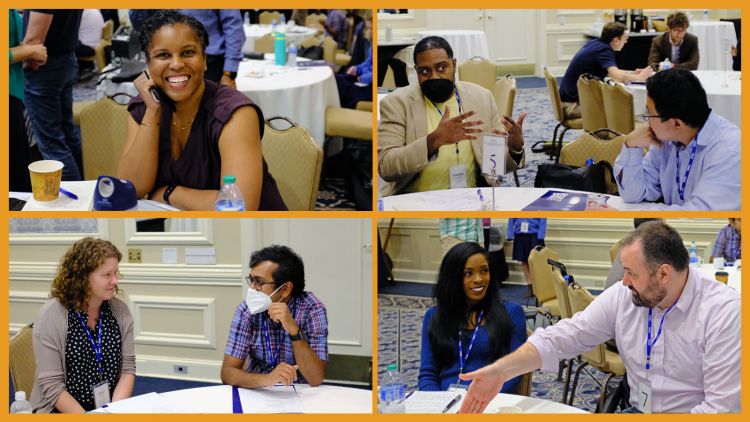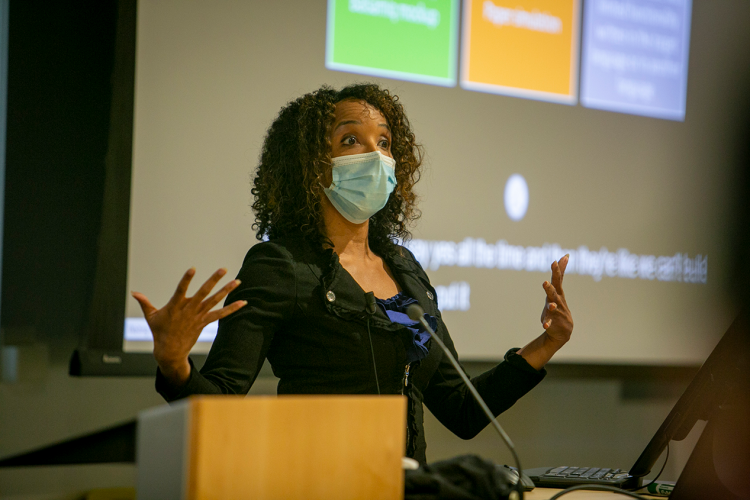Team 2030 Report Charts Course for Duke's Future
New report offers far-reaching recommendations for education, research, faculty career support and governance

In the early days of the COVID-19 pandemic, as unprecedented financial and operational pressures forced dramatic actions across the university, those circumstances also presented an opportunity to ask some fundamental questions about how the university works and seek avenues to distinguish the university in the future.
The job of asking those questions fell to a panel of faculty and university leaders appointed by President Vincent Price, called Strategy Team 2030. Nearly two years later, the group has issued recommendations suggesting far-reaching changes to university practices in research, education, finances and even governance.
There’s little dramatic about the team’s conclusion that Duke’s core identity—as an R1 university and academic medical center offering an undergraduate liberal arts education—should not change. Provost Sally Kornbluth, who chaired Team 2030’s steering committee, said “we are already doing many of the things that will distinguish the Duke of 2030 in both the undergraduate education and research realms. We also concluded that our greatest opportunity is in leaning in to the things that have the most potential to make Duke distinctive.”
The 2030 report identifies numerous areas where changes in current practices would amplify support for faculty scholarship and improve the Duke student experience at both the undergraduate and graduate student levels.
“The greatest avenue for significantly elevating Duke is in changing how we do these things to ensure that we are truly excellent and innovative, and that our culture facilitates, supports and celebrates scholarly pursuits,” Kornbluth said.
“The greatest avenue for significantly elevating Duke is in changing how we do these things to ensure that we are truly excellent and innovative, and that our culture facilitates, supports and celebrates scholarly pursuits.”
-- Sally Kornbluth
More than 40 academic leaders, faculty and administrators worked as part of the steering committee and four Strategy Team 2030 working groups coordinated by then-Associate Provost Noah Pickus. A second track of review was provided by an additional faculty committee chaired by Professor Peter Feaver of political science. This panel served in an advisory role, providing feedback on working group suggestions and offering recommendations of its own.
“Our approach was to press outside the box and ask hard questions about the sacred cows,” said Feaver, who also served on the Team 2030 Steering Committee. “We were the skunk at the party and raised a lot of inconvenient issues. Everything was on the table.”
The discussions were shaped by the situation the university faced early in the pandemic and the uncertainty about the degree to which the pandemic would affect Duke’s future finances, Feaver said. “Fortunately, the reality is the fiscal picture improved dramatically between May 2020 and summer 2021. Some of the most dramatic and painful choices were avoided.”
The 2030 working groups on research and collaboration, chaired by Vice Provost Ed Balleisen and Professor Anne West, and education, chaired by Pickus, recommended changes that address nearly every aspect of the university’s core education and research missions.

RESEARCH AND FACULTY CAREER DEVELOPMENT
Despite Duke’s strong record in advancing research, faculty reported barriers that hinder the kind of collaborative research that has underpinned the university reputation for pushing the boundaries of interdisciplinary exploration. To address these, the report focused on a set of changes to Duke’s culture, infrastructure and operations to make it easier for faculty to do research and navigate their careers, including:
- Providing more support structures for complex research, including project management and resources for data analysis, community-engaged inquiry and making it easier to share data across the university and health system.
- Developing new types of flexible funding support for interdisciplinary research, whether undertaken by teams or faculty who produce sole-authored scholarship.
- Providing an infusion of resources for all newly tenured faculty, a career stage at which the university wants to encourage further intellectual risk-taking.
- Expanding small group and one-on-one mentoring and coaching to support faculty career development.
In addition, the report calls for ensuring that Duke's culture of research administration fosters new avenues for creative research while maintaining the current foundation of scientific integrity and regulatory compliance, objectives that stand out as top priorities for Duke’s new Vice President for Research and Innovation, Jenny Lodge.
The vision, Kornbluth said, is “to facilitate risk-taking and lower the barriers to collaboration, whether across the boundaries of disciplines or schools, or with partners at other universities and beyond academia.”

UNDERGRADUATE EDUCATION
Duke’s undergraduate program is a point of pride, but Kornbluth said the committee wanted to take lessons learned from the pandemic to help keep Duke ahead of a rapidly changing higher education landscape and encourage deep inquiry by undergraduate students.
Many of the recommendations seek to better integrate the numerous programs through which Duke students develop their intellectual interests, and to use the entire resources of the university, including the residential experience, to give coherence to their education.
“Our goal is to create a learning experience in which all students have opportunities to engage in deep moments of discovery and to integrate their formal academic studies with their extensive out of class experiences,” Kornbluth said.
Among the recommendations are:
- Providing more opportunities for professional school faculty to be involved in undergraduate education, as part of a wider effort to strengthen faculty engagement with undergraduates.
- Developing a new curriculum that integrates curricular and co-curricular experiences for a more cohesive academic experience, and ensures that all students have at least one capstone experience that synthesizes their academic journey at Duke.
- Reimagining faculty contracts, compensation, and requirements for promotion in order to support more high-touch teaching, mentoring and guidance for student research and scholarship.
- Exploring innovative uses of the academic calendar to accommodate different models of learning experiences.
- Experimenting with the appropriate use of online and hybrid education to increase flexibility in completing an undergraduate degree.
GRADUATE AND PROFESSIONAL EDUCATION
Graduate and professional students now comprise around 60% of the Duke student body. Since the 2018 Report on Reimagining Doctoral Education, the university has placed an increased focus on graduate level training and experiences.
The Strategy Team 2030 report recommends extending this work by increasing graduate and professional student opportunities for experiential learning and collaboration across disciplines and schools, improving advising programs across the university, and expanding efforts to diversify the graduate and professional student body.
GOVERNANCE
The governance working group, chaired by Professor Don Taylor, also recommended changing some long-standing practices, including revising governance of the undergraduate curriculum to give a stronger say to university-wide committees. Other changes include re-evaluating presidential and provostial committees to ensure they are addressing the essential challenges facing the university.
BECOMING THE DUKE OF 2030
Next steps are already being taken. The faculty panel has dissolved, but members of the Strategy Team 2030 working groups are now shifting to implementation, including putting a price tag on the recommendations. Kornbluth told the Academic Council in February that she “wasn’t waiting until 2030 to make these happen.” Instead, the recommendations should be implemented in a phased approach between now and 2030.
Feaver noted that the report dealt with contentious issues and some recommendations didn’t have unanimous support from the faculty panel. Where there was strong agreement, he said, is the university will look different in 2030, and the report necessarily focused on making important changes.
“This report recognizes we’re in a new, different world,” Feaver said. “It won’t be like it was before the pandemic, and we need to up our game just to maintain our standing. One of the very biggest conclusions is that we had challenges even before the pandemic.
“If we look ahead to 2030, we need to be a more nimble organization, leverage individual pockets of strength, make sure investments are helping the university, and even do professional development for faculty in a different way. We can’t do business the way that we’ve done it in the past.”